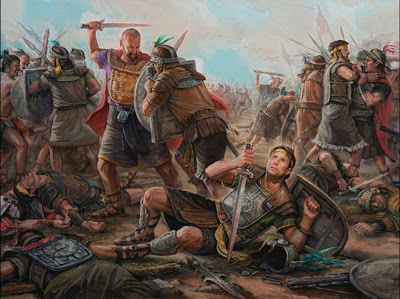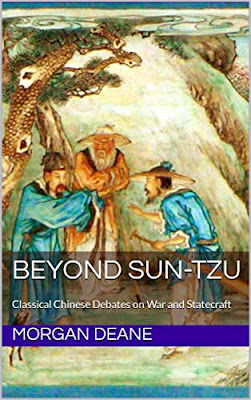The following is a response to an LDS isolationist that wrote an apology for Putin here. I thought it was a concerning argument because it minimized the Christian duty that Latter Day Saints should have to stop the slaughter of Ukrainians. I reprint it here because, frankly, I'm kind of offended that an expert on the topic is so blithely censored by someone who claims to love liberty.
My response is also a sneak preview of an article I wrote for Public Square Magazine. I think it is a pretty good public statement on the Ukrainian crisis from a military historian with an upcoming book on military ethics.
For my military analysis on the invasion please see my articles from the Epoch Times, particularly the Temptation of Isolationism, which applies to article I'm rebutting here, and Patterns in the Dust, which tells you what to notice and learn from the Russian performance. As they have stumbled in the early days to meet their goals I think it was particularly keen.
Also notice below how much more closely I align to scriptures and major thinkers on the topic than the writer who deletes me for not "contributing" to the conversation. Without further ado:
It's very concerning that your response to the most blatantly unjustified and nakedly aggressive war that I've ever seen is to try and make the issue grey. And you do so by claiming there are nefarious actors manipulating us into war, and by using a skewed history, from antiwar.com lol, to try and claim there are really no good guys.
You say you aren't excusing the invasion, but then you pretty much do by blaming NATO for it, linking to posts saying we should have recognized Russian territorial ambitions, and claiming we are manipulated if we think there are good and bad guys.
I agree that peace is the highest goal we should all strive for. But standing idly by in the name of peace as people are slaughtered is uncaring and frankly, un Christian. John Calvin called standing by while people are slaughtered the greatest injustice. Thomas Aquinas labelled situations like that an "evil peace."
Catholic theologian Paul Ramsey summarized the point simply when he asked, what would the Good Samaritan have done if he happened upon the beaten traveler in the middle of the attack instead of after it? It is absurd to think in the name of peace (or the Mormon version of the impulse, renouncing war), he would have picked up the other cheek to be struck. Or posted a meme about peace or filter as he watched it. Maybe he would have lectured other would be interventionists that try to stop the beating about peace while giving a long tendentious history of Jewish bandit relations.
Clearly, the Good Samaritan would have done something, up to and including the use of force to stop it. That impulse doesn't stop because the scale is bigger or you have ideological filters and geopolitical quibbles. And that motivating love for our neighbor is before we consider clear Book of Mormon verses that plainly teach we shouldn't let those we love be killed by the "barbarous cruelty" of aggressors. Or the very plain, "ye shall defend your family unto bloodshed" (Alma 48:24; 43:47).
The Ukrainians are our neighbors. Despite your attempts to muddy the waters they are more so than the Samaritans were to the Jews. (Which is why Jesus chose a good Samaritan and not a good Pharisee, wiseman, or libertarian to illustrate that love). And all the talk of peace in your post is really a deflection from the loving obligation we owe to our neighbors.
I work as a free lance author. If you found value in this work, normally I'd ask for a donation. But in this case please donate to an appropriate charity that will help the people of Ukraine.







